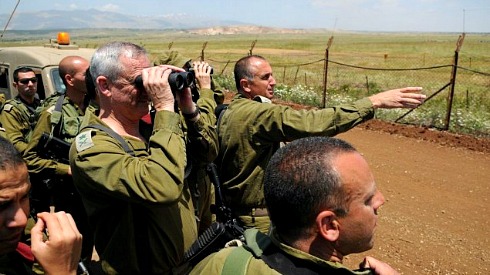Archives
AND MORE...

An Embarrassment Of Thugs
_____________________

Islamism Metastasizing
_____________________

Chock Full o'Nuts
_____________________

A Culture Of Savagery
_____________________
May 22, 2013
Distraction, Arab-Style
A day after the IDF and the Syrian Army exchanged fire in the Golan Heights, Israel Air Force Chief Maj.-Gen. Amir Eshel warned that Israel must be prepared for a "surprise war" developing (see below).
After Russia said last week it remains committed to an arms deal with Syria to deliver the S-300 air defense system to the Assad regime, Eshel warned that the advanced platform, which is "on the way" to Syria, could change the equation.
No surprise, as Arab regimes have a tendency to initiate wars (or fund proxies, who then attack) in order to distract from internal domestic upheaval. The Assad regime is currently embroiled in a civil war and LOTS of internal domestic upheaval. Rather than deal with its own problems, diverting attention towards Israel is, and always has been distraction, Arab-style.
Jerusalem Post | May 22, 2013
Amid Syria Tensions, IAF Chief Says 'Surprise War' A Threat
Maj.-Gen. Eshel says S-300 missile defense system "on the way" to Syria from Russia; hints that advanced platform could embolden Assad; Gantz: The IDF is facing a substantial threat of a multi-arena conflict.
By Yaakov Lappin, JPost.com staff

IDF Chief of Staff Lt. Gen. Benny Gantz uses binoculars to look across Israel's border with Syria, Tuesday (photo credit: IDF Spokesperson / courtesy: timesofisrael.com)
A day after the IDF and the Syrian Army exchanged fire in the Golan Heights, Israel Air Force chief Maj.-Gen. Amir Eshel warned that Israel must be prepared for a "surprise war" developing.
Addressing a national security conference in Herzliya held by the Fisher Brothers Institute for Air and Space Strategic Studies, Eshel stated that "a surprise war can develop today in many forms. Isolated events can escalate very quickly and require that we are ready in hours to act in the full spectrum - and when I say the full spectrum, I mean activating the full capabilities of the Air Force."
Eshel stated that, in the Second Lebanon War, the IAF had employed just a "small amount" of its capabilities, but that in the next war, the Air Force "will need to give 100 percent, in order that our operations will be very quick and powerful."
He said in a future war, the IAF will have to pave a path for the Ground Forces through very heavy bombings that will hit the ground and turn a ground offensive into something that is far easier and faster. "We must be the central component in a ground maneuver, and we are dealing with this a lot."
After Russia said last week that it remains committed to an arms deal with Syria to deliver the S-300 air defense system to the Assad regime, Eshel warned that the advanced platform, which he said was "on the way" to Syria, could change the equation.
Eshel said that the "the Assad regime has invested much to achieve the best air defenses that it could buy," including the SA-17, SA-22, SA-24, and the S-300.
"These systems are not only an operational threat. They also lead to an increased sense of security that can lead states to do things they would not otherwise do. This is a totally different generation of weapons, which does not resemble anything in the past. But there's no system that has no solution. The question is only the price."
Eshel said Syria is "changing before our eyes. If it collapses tomorrow, we could find its vast arsenal dispersed and pointed at us."
Also on Wednesday, IDF Chief of Staff Lt.-Gen. Benny Gantz spoke to graduates of the IDF Command and Staff College, telling them that the military is at "a significant point on the axis of time in light of the developing security threats and instability around us."
The IDF is facing a substantial threat of a multi-arena conflict, Gantz warned. "We must work in a joined manner, coordinated, and with maximum efficiency to ensure our ability to win quickly in every confrontation, and to win every future war," the chief of staff said.
The ground maneuver today remains "important and relevant" in the IDF's ability to secure a victory, Gantz said, adding that "it's clear that we must strengthen our ability for an offensive maneuver" that will be made up of components such as intelligence, firepower, logistics, and teleprocessing. These should ensure a flexible, swift, deadly ground maneuver, Gantz said.
Original article here.
Log In »
Notable Quotables
"Mr. Netanyahu is one of the most media-savvy politicians on the planet. On Friday he appeared live via video link on 'Real Time with Bill Maher,' taking the host’s alternately sardonic and serious line of questioning with gazelle-like alacrity."
~ Anthony Grant, jourrnalist who has written for many major newspapers and worked in television at Paris and Tel Aviv, interviewing former PM Benjamin Netanyahu on Monday, at the outset of Mr. Netanyahu's new book (more here).


